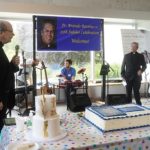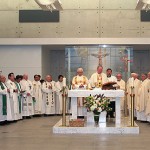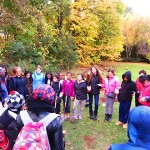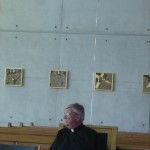Every time we celebrate Mass, the Holy Eucharist, we celebrate the Body and Blood of Christ. We bring our humble gifts of bread and wine to the altar. The priest calls upon the Holy Spirit to come down upon our gifts to that they may become for us the body and blood or our Lord Jesus Christ as at whose command we celebrate these mysteries, our sacrifice of thanksgiving.
St. Paul tells us in our second reading that as often as we eat this bread and drink this cup we proclaim the death of the Lord until he comes again. As often as we do these things, say these words, we re-present, we make present here and now, in this time and space, the Passion, Death and Resurrection of Christ.
When St. Paul wrote his letter to the Christian community in Corinth he was hopping mad at the Corinthians. In those days there were no churches, no places of worship like we have today. The believers gathered in one another’s homes, usually in the homes of people who could afford a big home. The breaking of the bread and the sharing of the cup was incorporated into the reading of scripture and having a meal. It was a bit of a potluck supper, people brought what they could to the table. Paul tells them he’s gotten reports that in their “coming together” they do not really come together at all. For the more privileged and wealthier among them eat heartily and even get drunk, whereas the poorer members get less, and some are even left out. The social gap between rich and poor becomes evident in their celebration of the Lord’s Supper.
Paul is determined to confront this scandal of division so he tells them again the tradition that he had already passed on to them when he had originally catechized them. Reminding them of the solemn account of the Last Supper is meant to shock them into the realization that their failure to care for one another’s needs in their practice of the Lord’s Supper flies in the face of the very meaning of that ritual enactment. He taught them that the Lord’s Supper commemorates Jesus’ “handing over” of himself for our redemption. So their celebration of that event should be evident of their “handing over” of themselves to one another, at least in seeing that each is decently fed.
Paul drives this point home a few lines later, when he says, “For anyone who eats and drinks without discerning the body, without discerning the whole community, not just those of their own social standing, eats and drinks judgment on himself” He goes on to say, “because the loaf of bread is one, we, though many, are one body, for we all partake of the one loaf” Paul makes it clear that by “discerning the body” he means seeing the believing community as the one body of Christ. And so, however the rest of their culture may discriminate between privileged and non-privileged, the haves and the have nots, the slaves and the free, Christians, when they come together for the Lord’s Supper, are to “receive” one another as mutual guests.
That teaching is as true today as it was when Paul first taught it. One bread one body, one cup of blessing which we bless makes us one body, the body of Christ. The Mass is the sacrament, the sign of our oneness with Jesus the Christ.
If when we come to the priest or a minister of the Eucharist harbouring in our hearts strong feels of resentment or rejection of other men and women because of their social standing, their racial origin, their religious faith, their life style or sexual orientation, is it possible we are receiving Holy Communion unworthily, even though unknowingly? Are we failing to see the unity of our community as we share in the one bread and one cup?
When St. Augustine gave people Holy Communion he would say, ‘Receive what you are and become what you receive – the body of Christ. As each of us receives Communion today may we be given the strength we need to ‘put on Christ, grow to full maturity in Christ’ so that in the ordinary living of our ordinary lives we may accepting and loving to all those who come into our lives.
 Founded by St. Paul of the Cross, every Passionist takes a special vow to spend his or her energies in promoting remembrance of the sufferings of Jesus, the memory of the Cross, and reflection of the meaning of the Cross for the world.
Founded by St. Paul of the Cross, every Passionist takes a special vow to spend his or her energies in promoting remembrance of the sufferings of Jesus, the memory of the Cross, and reflection of the meaning of the Cross for the world.




